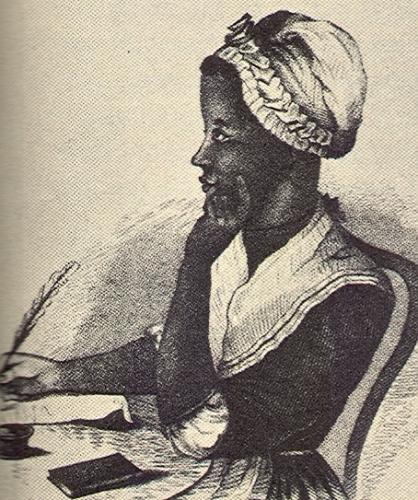 |
LITR 4231 Early American
Literature Sample Research Posts 2014 (research post assignment) Research Post 2 |
 |
Brenda Trejo
April 19, 2014.
SUSANNA HASWELL-ROWSON
In this course we have learned the differences between women authors from men
authors; they show more emotions so that they appear more realistic. Their
stories have a different way of putting things in perspective. Theirs are more
sentimental and romantic, which attracted a bigger women's audience. That does
not mean that their stories did not attract male readers; it is just that this
was not a feature the women had. Women were caregivers and governesses of their
homes; their duty was the household and children. If a house did not run
smoothly the man had to step in, which meant that women had failed as housewives
and that was an embarrassment. Sadly, women rarely had things to do other than
the house chores, so they needed a distraction. These were some of things that
they could do: knitting, playing instruments, reading and writing. This is one
of the things that Susanna Haswell-Rowson accomplished and luckily for us she
has taught us valuable lessons from her novels.
She was unfortunate to have lost her mother Susanna Musgrave, just 10 days after
she was born in Portsmouth, England in 1762. Her father, Navy Lieutenant William
Haswell later remarried Rachel Woodward, when she was around four years old;
this marriage gave Rowson two half-brothers. Haswell-Rowson was well-educated
and for pleasure she read authors like Virgil, Homer, and Shakespeare.
Lieutenant Haswell did not change sides with the Americans during the
Revolutionary War. Luckily, the family was able to live from the assistance of
others, when they lost their possessions. This was such a troublesome time for
the family that Susanna got a job.
Susanna, named after her mother, married a man named William, like her father.
William Rowson was a hardware merchant who had an illegitimate son. They did not
have any biological children together. William was the one who signed her
contracts even though he did not actually do anything. This was due to the
regulations in those times, which stated that women were unable to have any
possessions under their name. They were forced to return to the theatre due to
bankruptcy. They even opened their own theatre in Boston three years later.
Haswell-Rowson became an actress, playwright, poet and novelist. She was also
the founder of the Young Ladies Academy, an all-girl school, which she wrote
textbooks for. The following are novels and plays Susanna Haswell-Rowson wrote:
Victoria, A Trip to Parnassus, Charlotte
Temple: A Tale of Truth, Rebecca, or the Fille de Chambre, Trials of the Human
Heart, Reuben and Rachel, Sarah, the Exemplary Wife, Slaves in Algiers, or A
Struggle for Freedom, The Volunteer,
The Female Patriot, and Americans in England. The last time Rowson was on
stage was in 1797. In that same year she founded an all-girls school which
offered academic and refinement training. One of the textbooks she wrote was
Youth’s first Step in Geography. She
continued to work while she was running the school. For three years she was the
editor of The Boston Weekly Magazine. In her will Haswell-Rowson left
the school to her niece around 1822.
From Haswell-Rowson’s book, Charlotte
Temple, we can learn how young women are vulnerable to seduction and
betrayal, until they finally feel remorse—that is if they are capable of doing
so. The moral of the story is think before you act, for the choices you make may
have horrible consequences which will only lead to pain, sadness or even death.
This story sold well in England, but it did much better in America. During 1794,
it was the best seller. This story also has some similarities in Haswell-Rowson
real life, such as a mother dying after childbirth and a young woman leaving
England to America. This book has a sad and realistic story; yes, it is very
much a like a soap opera, especially in our times where life has become a place
where morals and virtues are hard to find in the youth. The morals and lessons
learned in this novel will help other women and people in general to look after
and value their families. Family is an important thing to have; even though they
may not be perfect, most of the times you know you can count on them.
This story made me open my eyes and believe that even though people make
mistakes, we can always come back from them. Most importantly I know they help
me grow, appreciate and value the good things that I have. These mistakes have
made me stronger person. They have allowed me to become closer to my family. I
am fortunate enough to have them in my corner and their love and support is
always shown. I am not the kind of girl that takes chances or makes mistakes, I
always have to think things through. I am glad that this novel has opened my
eyes and has helped me appreciate the life I have. In my younger years, I never
really acted out and at times I felt like I was missing out something for not
being so careless. But this book has showed me how fortunate I was for taking my
time with the choices I made. If I had been so carefree and wild, all my
mistakes could have challenged my life and maybe even destroyed it. It has also
taught me that it is alright to be careless at times and to enjoy my life a
little bit more without worrying about problems that may arise.
In sum, I have really enjoyed learning from Susanna Haswell-Rowson's personal
life. She was a great author; her life was extraordinary for a woman in those
times. I have also learned to not take life too seriously and to enjoy it. I
need to appreciate the good with the bad and to accept the consequences for my
actions. That having my family with me can and will help me overcome whatever
obstacle may come arise. This has also piqued my interest about the importance
of women writers of passed times. I hope that every author is valued for what
they create. Many people may think that women write as an escape. That their
novels are nothing more than romantic and trashy books that have no literary
significance. But in the end it is up to each of us to decide what we consider a
good piece of literature is.
References
http://coursesite.uhcl.edu/HSH/Whitec/xauthors/Rowson.htm
http://coursesite.uhcl.edu/HSH/Whitec/texts/AmClassics/RomFiction/RowsonCTemple/default.html
http://college.cengage.com/english/lauter/heath/4e/students/author_pages/eighteenth/rowson_su.html
http://womeninhistoryprograms.com/rowson.html
http://www.encyclopedia.com/topic/Susanna_Haswell_Rowson.aspx
|
|
|
|

